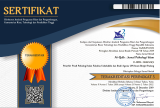PENGARUH MEMBACA AL-QUR’AN TERHADAP PENINGKATAN ADVERSITY QUOTIENT PADA SISWI ASRAMA SITI KHADIJAH
Abstract
Al-Qur'an which was revealed to change the thoughts, attitudes and human behavior and pointed at them. So that humans can avoid the downturn in the face of life problems. Each individual has a different response to the problem it faces. Some choose to avoid problems and some struggle to resolve the issue. This is seen from the toughness or the individual's Adveristy Quotient. Adversity Quotient is one form of intelligence that underlies one's success in facing a challenge in the event of difficulty or failure. In this case reading the Qur'an that is reflected to the teenager to get motivation and understanding of his views on the problems they face. As well as through reading the Qur'an will contribute to the improvement of adolescent Adversity Quotient.
The research method used is pure experimental method, with pretest-posttest control group design design with 38 subjects. Subjects were selected based on randomization measured using Adveristy Quotient scale, divided into two groups: the experimental group and the control group, each group was 19 people. The experimental group was given the treatment of reading al-Qur'an, while the control group did not. Based on the pretest results, the experimental group and the control group showed moderate category Adversity Quotient. In the posttest results, the experimental group experienced improvement after treatment. While the untreated control group did not increase, even the decrease of Adversity Quotient
The result of the research proves that the giving of treatment in reading al-Qur'an has an effect on the increase of Adversity Quotient to the students of hostel Siti Khadijah MAN Koto Baru Solok. Adversity Quotient scale proves that the implementation of reading al-Qur'an takes place smoothly for the participants.
Keywords
Full Text:
PDFReferences
Abidin, Zainal. (1992). Seluk Beluk al-Qur'an. Jakarta: PT Rineka Cipta.
Anshori. (2013). Ulumul Qur'an: Kaidah Memahami Firman Tuhan. Jakarta: Rajawali Pers.
Chaplin, P. (2009). Kamus Lengkap Psikologi. Jakarta: Rajawali Pers.
Echols, J. M. & Shadily, H. (2014). Kamus Inggris-Indonesia Edisi yang Diperbarui. Jakarta: PT Gramedia Pustaka.
Hurlock, E, B. (1993). Psikologi Perkembangan: Suatu Pendekatan Sepanjang Rentang Kehidupan Edisi ke-5. Jakarta: Erlangga.
Jalaluddin. (2011). Psikologi Agama Memahami Perilaku Keagamaan dengan Mengaplikasikan Prinsip-prinsip Psikologi. Jakarta:Raja Grafindo Persada.
Khon, A.M. (2007). Pratikum Qira'at: Keanehan Bacaan al-Qur'an. Jakarta: Amzah.
Khon, A.M. (2011). Pratikum Qira'at: Keanehan Bacaan al-Qur'an Edisi Revisi. Jakarta: Amzah.
Latipun. (2006). Psikologi Ekperimen Edisi ke Dua. Malang: Universitas Muhammadiyah Malang.
Lutfiah, S & Khalifah. (2010). Religiopsioneuroimunologi al-Qur'an (Studi Kolaborasi Terapi al-Qur'an dan Fungsi Otak dalam Menghadapi Stres. Buletin Psikologi: Fakultas Psikologi Universitas Gajah Mada ISSN:0854-7108 18(1) , 19-28.
Mar'ati, R & Chaer, M.T. (2016). Pengaruh Pembacaan dan Pemaknaan Ayat-ayat al-Qur'an Terhadap Penurunan Kecemasan pada Santriwati. Psikohumaniora: Jurnal Penelitian Psikologi. Volume 1 No. 1 hal. 30-48.
Nawawi, R.S. (2011). Kepribadian Qur’ani. Jakarta: Amzah.
Pedak, M. (2009). Qur’an for Gen (Mukjizat Terapi al-Qur’an untuk Hidup Sukses). Jakarta: Wahyumedia.
Pradika, F.M. (2014). Hubungan Antara Intensitas Membaca Ayat Suci al-Qur'an dengan Kepercayaan Diri pada Mentor Kegiatan Mentoring Universitas Muhammadiyah Surakarta. Fakultas Psikologi Universitas Surakarta. Skripsi tidak diterbitkan.
Sapuri, R. (2009). Psikologi Islam: Tuntunan Jiwa Manusia Modern. Jakarta: Rajawali Pers.
Stoltz, P. G. (2000). Adversity Quotient: Mengubah Hambatan Menjadi Peluang. Jakarta: PT Grasindo.
Sugiyono (2010). Metode Penelitian Kuantitatif, Kualitatif dan R&D. Bandung: Alfabeta.
Utsman, N.M. (2005). Psikologi Islam dalam al-Qur'an (Terapi Qur'ani dalam Penyembuhan Gangguan Kejiwaan). Bandung: Pustaka Setia.
Zulaiha. S. (2014). Pengaruh Tadarus al-Quran terhadap Kecerdasan Spiritual (Ikhlas) di SDIT MTA Gemolong Kabupaten Sragen. Naskah Publikasi. Fakultas Keguruan dan Ilmu Pendidikan Universitas Muhammadiyah Surabrata.
Refbacks
- There are currently no refbacks.
Ruang Jurnal,
Fakultas Ushuluddin dan Studi Agama,
UIN Imam Bonjol Padang
Jl. Mahmud Yunus No.6,Lubuk Lintah,
Kota Padang, Sumatra Barat
E-mail: jurnal-alqalb@uinib.ac.id

This work is licensed under a Creative Commons Attribution-ShareAlike 4.0 International License.



